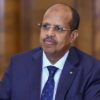CAIRO, Jan 30 – Embattled Hosni Mubarak tapped Egypt\’s military intelligence chief as his first-ever vice president and named a new premier, as the death toll in a mass revolt against his autocratic rule topped 100.
Fresh riots Saturday, the fifth day of the revolt, left 22 people dead in the town of Beni Sueif, south of Cairo, where protesters tried to burn down a police station, witnesses and a security source said.
Another three protesters died in Cairo and three police were killed in the Sinai town of Rafah, raising to at least 102 the number of people killed since the unrest erupted on Tuesday, including 33 on Saturday, according to medics.
As tens of thousands flooded central Cairo demanding he step down, President Mubarak went into crisis talks with officials, after which it was announced that Mubarak confidant General Omar Suleiman had been sworn in as his deputy.
Suleiman, 75, is a career army man and chief of military intelligence.
He has spearheaded years of Egyptian efforts to clinch an elusive Israeli-Palestinian peace deal and tried so far in vain to mediate an inter-Palestinian reconciliation.
Demonstrators have dismissed the 82-year-old president\’s vague promises of political and economic reform as too little, too late and were not impressed with Suleiman\’s appointment.
The crowd in Tahrir (Liberation) Square, the epicentre of the revolt in the Egyptian capital, chanted "Neither Mubarak nor Suleiman; we\’re sick of Americans."
In line with Mubarak\’s orders, the cabinet resigned on Saturday and the president later tapped the outgoing aviation minister, Ahmed Shafiq, to form a new government.
Shafiq, 69, is respected by the Egyptian elite, even among the opposition, and has often been mooted as a potential successor to Mubarak.
But Mohamed ElBaradei, the Nobel laureate and former UN chief nuclear inspector who has emerged as a dissident leader in his homeland, said the appointments were insufficient.
"I tell President Mubarak and his regime to leave Egypt as soon as possible. It will be better for Egypt and for you," he said in remarks to Al-Jazeera television.
Egyptians were watching to see if widely hated Interior Minister Habib al-Adly, in office since 1997 and responsible for the security apparatus, will keep his job.
Along with the demonstrations in several cities, looting broke out in the capital after the police appeared to have faded from the scene, prompting the army to call on citizens to defend themselves.
The army announced that a night-time curfew would be enforced and extended in key cities. But when the new 4:00 pm to 8:00 am lockdown went into effect, demonstrators in Cairo paid no heed.
Later, the army stood back as protesters fought running battles with police in front of the interior ministry.
Hundreds of demonstrators threw Molotov cocktails at police near the heart of five days of protests, and policemen responded with live rounds of gunfire, witnesses said. Medics said three people were killed.
By late evening most people had gone home, apart from vigilante protection committees seeking to deter looters on residential streets and over 1,000 people camped out on Tahrir Square.
As Mubarak stood his ground, influential Arab cleric Yusuf al-Qaradawi called on him to quit, in an interview with Al-Jazeera.
"Leave Mubarak. Have pity on the people and get lost before the destruction spreads in Egypt," said the Egyptian-born president of the International Union of Muslim Scholars, who called the president "deaf, dumb and blind."
And the banned Muslim Brotherhood, Egypt\’s best-organised opposition group, called for a peaceful transfer of power through a transitional cabinet.
The United States said Saturday that Mubarak should carry out "real reform" beyond a government reshuffle, as the US president met top aides on the crisis and anti-Mubarak protests spread to US cities.
President Barack Obama gathered his national security team at the White House for a session lasting just over an hour on latest developments in Egypt.
The US president "reiterated our focus on opposing violence and calling for restraint; supporting universal rights; and supporting concrete steps that advance political reform within Egypt," a White House statement said.
Protesters want not only Mubarak\’s departure but an end to endemic corruption and police brutality that have become systemic under the president\’s 30-year rule.
Earlier on Saturday, young Egyptians had already formed a human chain to protect the Cairo Museum, which is located in Tahrir Square and houses the famous Tutankhamun mask and other priceless antiquities.
Elsewhere, clashes erupted in the key port city of Ismailiya, northeast of Cairo, where thousands of workers fought running battles with police.
In Alexandria, hundreds of people camped out by the main mosque in the centre of the Mediterranean city vowing to protest again, with several police stations still burning amid sporadic looting.
As in Cairo, tanks were deployed and the police were absent. Civilians directed traffic and conducted clean-up efforts.
Despite the ongoing protests, two Cairo mobile phone networks came back on line on Saturday, a day after all Egyptian operators were told to suspend services.
The demonstrations, inspired by events in Tunisia, are unprecedented in Mubarak\’s Egypt and have sent shock waves across the region. At least 1,500 civilians and 1,000 police have been injured since Tuesday.
Hundreds of demonstrators calling for Mubarak to go rallied outside Egyptian embassies in Paris and Washington on Saturday as well as at the United Nations headquarters in New York.
Travel agencies postponed departures for popular tourist destinations, as capitals warned their citizens to avoid visiting Egypt, which counts on tourism as a prime source of foreign exchange.














































